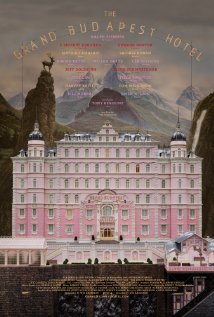 “The Grand Budapest Hotel” on IMDB
“The Grand Budapest Hotel” on IMDB
Comedy, 100 Minutes, 2014
You know those annoying fanboys that believe that their favorite director can do no wrong? They’ll talk about them endlessly, insist other people pay attention to them and challenge anybody that says the least critical thing about them. They make fools of themselves as they ignore obvious issues and rationalize away every shortcoming.
Aren’t those people insufferable?! Why can’t they understand that no director is perfect (except for Wes Anderson [IMDB])? That everybody makes mistakes (except for Wes Anderson)? That nobody can always knock it out of the park every single time (except for Wes Anderson)?
Some people are just unable to think critically (about people that aren’t Wes Anderson)!
The movie is stunningly, almost painfully, good. It’s one of the purest comedies I’ve seen in a long, sad, while. Most recent comedies follow a clear, depressing blueprint: funny in the first third, slow in the second and ending with a frenetic, action sequence that also shows that it has a heart.
In contrast this is funny – hilariously, gut-bustingly so – from start to finish. It doesn’t vapidly change gears to demonstrate an emotional side; every scene has exactly what it needs and nothing else. The characters are whimsical without being farcical. They lack a certain depth and detail, but are powerfully defined. Lovingly, but roughly, hand crafted.
The actual story is secondary. Multiple timelines are intertwined, each sumptuously presented in the aspect ratio common during that period (1.37, 1.85 and 2.35:1). This lends another layer of visual interest to the film and creates opportunities for framing and presentation that Anderson uses to the fullest.
The majority of the film, set in the 1930’s, is in 1.37 and presents a taller, more square frame than most audiences are used to today. Because of this these sequences can leverage a richer, more vertical staging allowing the audience to often see multiple levels within a wide-shot or more of the floor and ceiling in medium shots. It’s difficult to describe, but there’s a sense of timelessness and, for lack of a better word, presence to these sequences that may surprise you.
The cast is amazingly diverse and nearly universally celebrated. The acting is purposefully stilted and slightly wooden, as befits what is essentially a pulp adventure story set against the backdrop of a fictional Eastern European luxury hotel. The dialog is sharp and hilarious and a masterpiece of comedic timing. Unlike most modern comedies, however, exquisite care is also taken to lace humor throughout the visuals. This is a film designed in all ways to make you laugh, not just a series of dull sets on which stand-up comedians ad lib jokes.
I adored this movie. I adored the way it looked and moved. I adored the mindful wackiness and the hilariously casual obscenity. It’s the kind of movie that reminds you that art, quality and style don’t have to be serious and unforgiving. They can also be hilarious.
